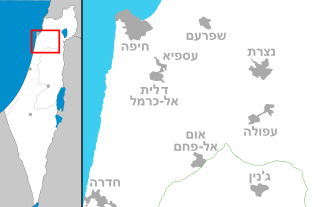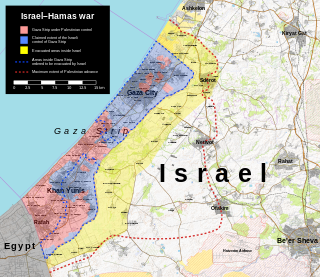This article describes the use of torture since the adoption of the 1948 Universal Declaration of Human Rights (UDHR), which prohibited it. Torture is prohibited by international law and is illegal in most countries. However, it is still used by many governments.
Black sites are clandestine detention centers operated by a state where prisoners who have not been charged with a crime are incarcerated without due process or court order, are often mistreated and murdered, and have no recourse to bail.

Camp 1391, also referred to as Unit 1391 or Facility 1391, is an Israel Defense Forces prison camp in northern Israel for "high-risk" prisoners. It is run by Unit 504. The existence of the prison was unknown to the public before 2003, and most information about it remains classified, although the Supreme Court of Israel ordered the release of some information about the jail.

Ofer Prison, formerly officially known as Incarceration Facility 385, is an Israeli incarceration facility in the Israeli-occupied West Bank. It is one of three prison facilities along with Megiddo and Ktzi'ot, the latter two located in Israel and not in the West Bank. Ofer Prison is run by the Israel Prison Service and like the other two facilities, used to be operated by the Israel Defense Forces' Military Police Corps.
The future of Palestinian prisoners detained by Israel in the context of the Israeli–Palestinian conflict is considered central to progress in the Israeli–Palestinian peace process. Cases of prison sentences include the charges of terrorism or being a member of an "illegal terrorist organization", such as Hamas or prior to the Oslo Accords the Palestine Liberation Organization, but according to some accounts also by political activism such as raising a Palestinian flag.

Ktzi'ot Prison is an Israeli detention facility located in the Negev desert 45 miles (72 km) south-west of Beersheba. It is Israel's largest detention facility in terms of land area, encompassing 400,000 m2.
Hana Shalabi is a Palestinian prisoner in Israel, held in administrative detention.
Israeli torture in the occupied territories refers to the use of torture and systematic degrading practices on Palestinians detained by Israeli forces in both the West Bank and Gaza Strip. The practice, routine for decades, was eventually reviewed by the Supreme Court of Israel in 1999, which found that "coercive interrogation" of Palestinians had been widespread, and deemed it unlawful, though permissible in certain cases. Torture is also practiced by the Palestinian authorities in the West Bank and the Gaza Strip.
Torture and systematic degrading practices have been inflicted on civilians detained by Palestinian forces in the West Bank and the Gaza Strip. As of 2018, Amnesty reported that LGBT people were subjected to arbitrary arrest and ill-treatment.

Hanoch Dov Milwidsky is an Israeli politician who currently serves as a member of the Knesset for Likud.

The Israeli invasion of the Gaza Strip is a major part of the Israel–Hamas war. Starting on 7 October 2023, immediately after the Hamas-led attacks on Israel, it began bombing the Gaza Strip; on 13 October, Israel began ground operations in Gaza, and on 27 October, a full-scale invasion was launched. Israel's campaign has four stated goals: to destroy Hamas, to free the hostages, to ensure Gaza no longer poses a threat to Israel, and to return displaced residents of Northern Israel. More than 35,000 Palestinians have been killed in Gaza since the Israeli operation began, including more than 7,800 children and 4,900 women, with another 10,000 people missing and presumed dead under the rubble of destroyed buildings.

Since the start of the Israel–Hamas war on 7 October 2023, the UN Human Rights Council has identified "clear evidence" of war crimes by both Hamas and the Israel Defense Forces. A UN Commission to the Israel–Palestine conflict stated that there is "clear evidence that war crimes may have been committed in the latest explosion of violence in Israel and Gaza, and all those who have violated international law and targeted civilians must be held accountable." On 27 October, a spokesperson for the OHCHR called for an independent court to review potential war crimes committed by both sides.

Since the outbreak of the Israel–Hamas war on October 7, 2023, Israel has carried out mass arrests and detentions of Palestinians. Thousands have been arrested in the Israeli-occupied Palestinian territories and in Israel, based on alleged militant activity, offensive social media postings, or arbitrarily.
Women in the Israel–Hamas war refers to the experience of Israeli and Palestinian women as victims of violence, combatants, leadership partners, and as participants in informational campaigns during the Israel–Hamas war. The conflict has been marked by violence towards women, including reports of rape and sexual violence by Hamas militants. Following the Hamas-led attack on Israel on October 7, 2023, there were testimonies and videos indicating that Hamas employed methods of severe torture, including violence and sexual violence against Israeli women and children. Close to 100 Israeli women were taken hostage and held in Gaza, leading to efforts by Israeli women and organizations to raise awareness and promote their release. The UN Secretary-General and UN Women condemned the gender-based violence against Israeli women during the attacks.
During the Israel–Hamas war, a series of exchanges were made between Israel and Hamas to exchange militant-held hostages for Palestinian prisoners. The negotiations were brokered by Qatar, Egypt, and the United States, and were part of a broader temporary ceasefire agreement. In Israel the deal was called "Operation Heaven's Door", and the subprogram for the rehabilitation of foreign citizens was called "Operation "Friendly Hand".
The 2023 Israel–Hamas war led to an intensive interrogation program by Israeli intelligence agencies, particularly Israel's domestic security agency, Shin Bet and IDF's Unit 504, targeting captured "Hamas militants". Following the sudden attack on 7 October, which killed more than 1,100 Israelis, alleged militants were captured in Israel. Israel has claimed that the interrogation of the suspects revealed significant insights into the group's strategies, ideologies, and operational methods that played a crucial role in Israel's military response and in shaping the global understanding of the conflict.
During the ongoing Israel–Hamas war, Israeli male and female soldiers, guards as well as medical staff have reportedly committed wartime sexual violence against Palestinian children, women and men including rape, gang-rape, sexualized torture and mutilation. In February, UN experts cited at least two cases of Palestinian women being raped by male Israeli soldiers. Palestinian boys and men have also been raped and subjected to torture, and in some cases, the torture has led to the victim's death.
Adnan Al-Bursh was a Palestinian orthopedic surgeon and the head of orthopedics at the Gaza Strip's largest medical facility, Al-Shifa Hospital. He died after having been reportedly tortured in Israeli prison after four months of detention during the Israel–Hamas war.

Sde Teiman is an Israeli military base located in the Negev desert near the border with the Gaza Strip. During the Israel–Hamas war, its use as a detention camp doubled and gained international attention for its systemic human rights violations against its Palestinian detainees from the strip.

Since the beginning of the Israel–Hamas war in 2023, the Israeli military and authorities have been charged with committing war crimes, such as indiscriminate attacks on civilians in densely populated areas ; genocide; forced evacuations; the torture and executions of civilians; sexual violence including rape and gang rape of Palestinian men, women and children; destruction of cultural heritage; collective punishment; and the mistreatment and torture of Palestinian prisoners. Humanitarian organizations such as Human Rights Watch, Amnesty International, B'tselem, and Oxfam, as well as human rights groups and experts, including the UN Independent International Commission of Inquiry and United Nations special rapporteurs, have documented these actions.









